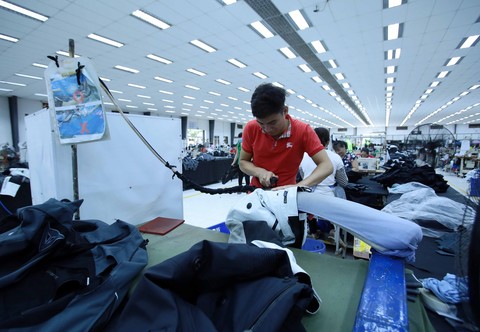
A garment production line at South Korea’s Kido Vietnam Company in Pho noi A Industrial Park in the northern province of Hung Yen. VNA/VNS Photo Pham Kien
The reduction of working hours from 48 hours per week to 44 hours will create difficulties for textile and garments enterprises, according to one leading expert.
Truong Van Cam, vice chairman of of the Viet Nam Textile and Apparel Association (Vitas), in the response to the draft revised Labour Code which made the change in May this year.
He told the Vietnam News Agency the industry is facing many challenges. Reducing the working week would have a negative impact on the industry and the economy.
Currently, Viet Nam sets normal working hours to not exceed 48 hours per week, enterprises of many industries such as textile and garment, leather and footwear still have to use all permitted overtime of 300 hours per year, he said.
"With the textile and garment industry with production scale at present, if we reduce by four working hours per week, the industry’s export value will be reduced by at least over US$3 billion per year," Cam said.
Viet Nam is a developing country, so a reduction means a reduction of production in goods and services, leading to reducing gross domestic product (GDP) for the society and GDP per capita, Cam said.
"Moreover, if the working hour reduces, to maintain the same volume of production and export value of the textile and garment industry at present, the businesses will have to recruit more workers, spending more trillions of dong to pay salary for the workers," Cam said.
"This is not feasible because at present, the textile and garment industry has faced labour shortages and there is competition to recruit workers, especially skilled workers. Besides, the businesses must increase spending, leading to a reduction in their competitive ability."
For many years, enterprises in the garment and textile industry and some other industries have repeatedly asked the State to extend the overtime to facilitate production, he said.
“We recommend not reducing the normal working hours from 48 hours per week to 44 hours,´ Cam said.
“For overtime, I agree with keeping the regulation of overtime working hours per day which is not more than 50 per cent of the normal working time in a day.”
However, the existing regulation has caused difficulties for businesses, especially for fashion and seasonal industries such as textiles, footwear and fisheries, he said. The industries will have periods to promote production to ensure quick delivery, so they need all overtime working hours.
At present, the State regulates overtime to be no more than 200 hours per year for general industries and 300 hours per year for specific industries like textile, garment and footwear.
Countries in the region also have much higher overtime hours than Viet Nam. Therefore, Vitas asked to extend the overtime working hour to 300 hours per year for general industries and 450 hours per year for specific industries, he said. — VNS